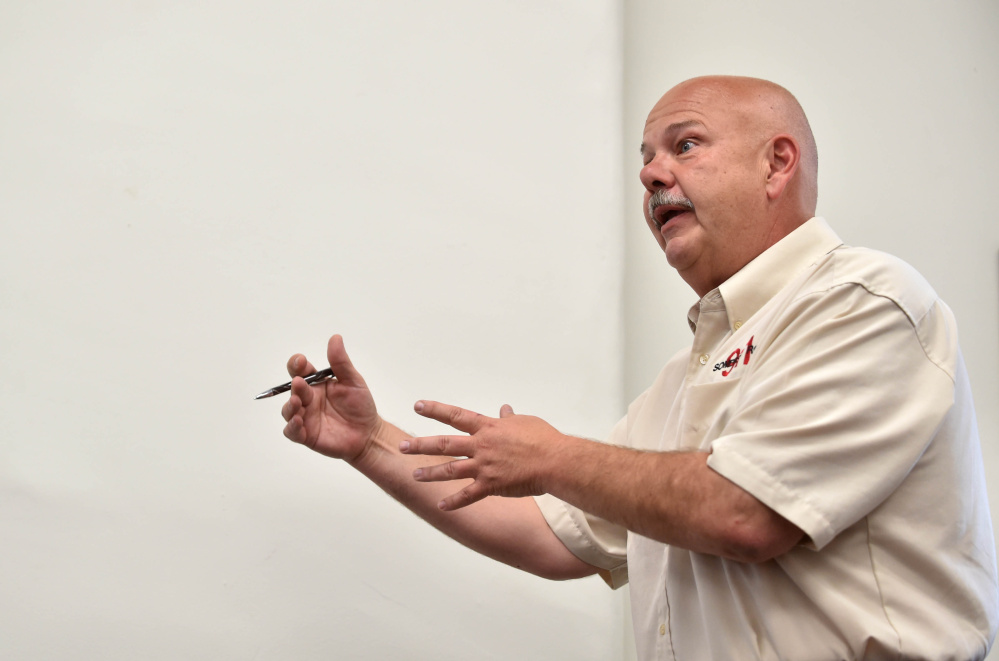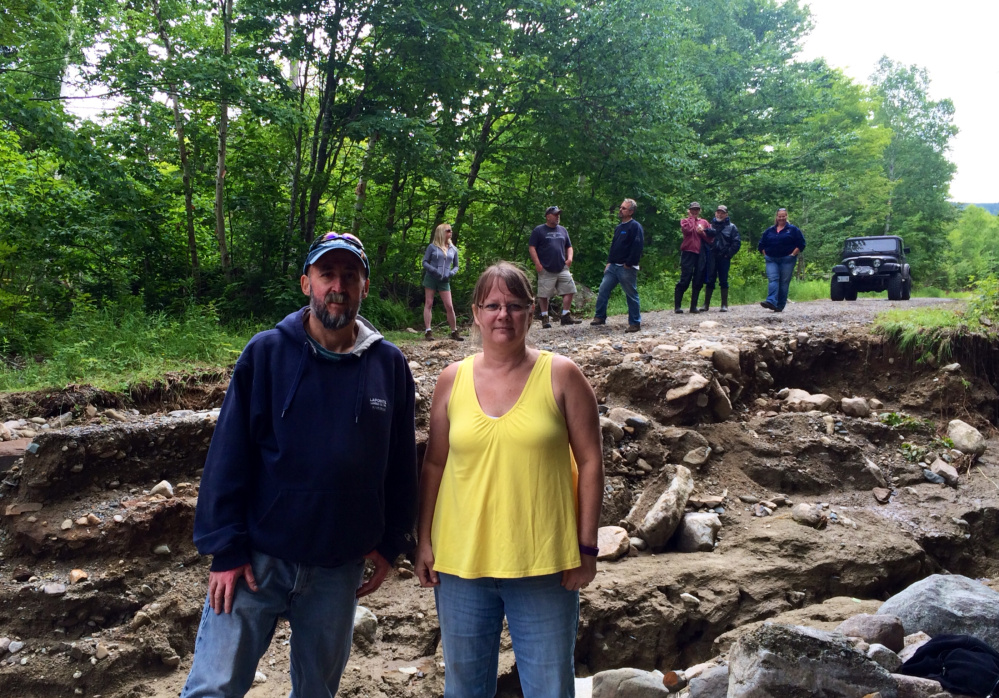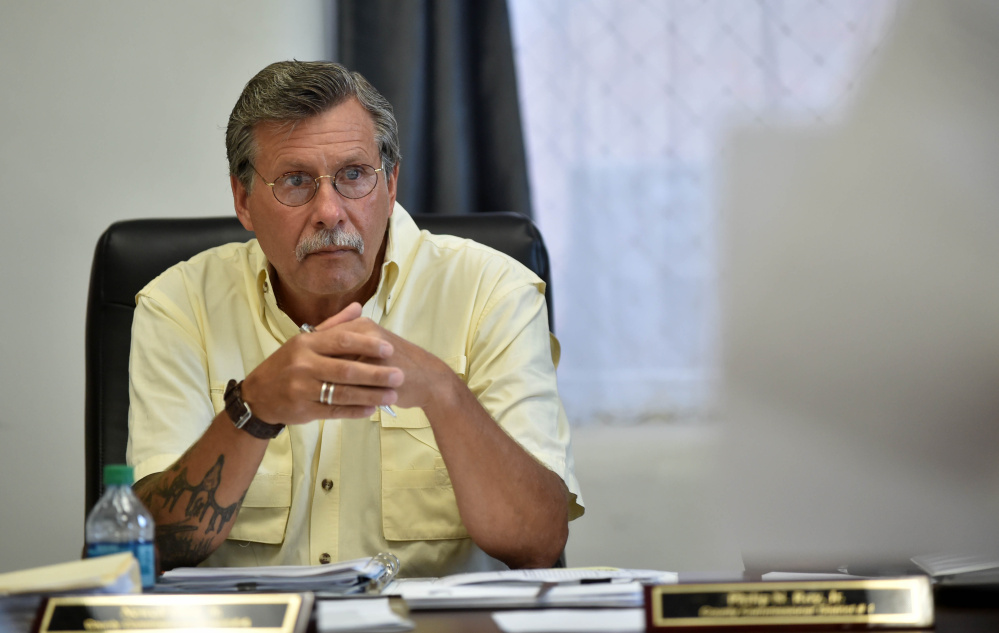SKOWHEGAN — Somerset County commissioners voted unanimously Wednesday to send letters to Gov. Paul LePage and the U.S. Department of Agriculture seeking assistance for repairs to a network of private roads in an unorganized territory that were severely damaged by flash floods last week.
State and local officials so far have said the dirt and gravel private roads, which are the thoroughfares for many year-round and seasonal residents and outdoors enthusiasts in the area, aren’t eligible for government aid.
“I’m 100 percent for sending a letter to the governor’s office asking him to look into the situation, the plight of these people and if there is any way to help them access their property,” said Commissioner Phil Roy. “The roads are important in an emergency situation. It’s a life safety issue.
“Unfortunately I just don’t see anywhere in the law that allows us to spend public funds on private property.”
The letter to the governor’s office will ask for discretionary funds for road repairs while the letter to the USDA will seek funding through low interest loans, grants or other means. Adrienne Bennett, press secretary for LePage, said the governor’s office is working on the situation, but she did not have an update Wednesday on what might be available.
More than 7 inches of rain fell during a five-hour period on June 29-30 in parts of Upper Enchanted Township, Johnson Mountain Township and Parlin Pond Township in the northwest section of the county. The flooding washed out the Parlin Pond bridge on U.S. Route 201 and also damaged the network of private roads to the west of Route 201, including Spencer Road, which is owned by timber company Weyerhaeuser, and side roads affecting more than 100 properties. Several people were trapped in the days immediately following the storm, according to residents and the heads of local road associations.
The situation has raised questions about whether government should assist private road owners faced with natural disasters. But government officials who have examined the issue have said they can’t dedicate public money toward repairs to private roads, no matter the scale of damage.
“I think the road associations are the appropriate venue, not that I don’t feel for them with that amount of damage,” said Newell Graf, chairman of the commissioners. “When you build those long roads for camp access and they’re private, it’s your responsibility to maintain them, and I think they’ve proven that by forming road associations.”
Phil Curtis, road commissioner for the unorganized territories, said Wednesday that he had not been approached by anyone about assistance to the area and that it was unlikely the county would help because the damage was to private roads.
“I’ve exhausted all avenues available, and I keep hitting the same barrier: it’s private land,” said Somerset County Emergency Management Agency Director Mike Smith, who spoke at Wednesday’s meeting.
Lloyd Trafton, the commissioner who represents the unorganized territory, asked whether some funding could be obtained for repairs. He said he believes that federal money has been granted to private homeowners and land owners in cases of natural disaster in some cases.
But the Maine Emergency Management Agency said last week that they cannot allocate federal dollars toward the repairs and even if they could, it would require a minimum threshold of $1.9 million in damages.
It has been hard to estimate the exact cost of the repairs, but they range between $150,000 and $1 million, Smith said Wednesday.
Repairs on Weyerhaeuser-owned Spencer Road, the main road connecting U.S. Route 201 to Spencer Lake and Franklin County, have already been started.
The company is “making headway” establishing pickup truck access on the road, according to public affairs manager Mark Doty. The company is also working with other road owners to help establish access, he said in an email.
The situation is an extreme example of the problems that private road owners face in Maine, said Betsy Connor Bowen, founder and webmaster of the Maine Alliance for Road Associations, a statewide resource for Maine road associations. The organization does not track the number of private roads in the state.
Connor Bowen said over the weekend she had never heard of a situation involving such extensive damage in Maine and estimated that repairs would likely exceed the road associations’ authority to raise money. Under state statute, road associations are only authorized to charge members up to 1 percent of their municipal property valuation in any calendar year.
“It’s an extreme example of how bad things can get,” she said in an email. “What to do in situations like this is an unsolved problem that is only going to get worse.”
Norman and Lisa Lapointe, who live in Vassalboro, are among about 30 property owners who were cut off from their properties on No Road. On Saturday, five days after the flooding, massive piles of rocks and boulders blocked the base of the road, and water still flowed through ravines that had cut through the gravel.
The Lapointes and others are accessing their property via a 45-minute detour over other private roads and ATV trails and said they have no idea how they’ll pay for repairs. “The devastation is unbelievable,” Lisa Lapointe said Saturday.
There are few other provisions that help private road owners in the case of natural disasters.
A state statute aimed at protecting great ponds – bodies of water of more than 10 acres – in instances where water quality could be harmed by private roads does not appear to apply to the Somerset County situation, according to Don Witherall, director of the division of environmental assessment for the Maine Department of Environmental Protection. Nearby Parlin Pond does not meet the state’s criteria for great ponds with endangered status that could bring in additional funding, he said.
However, the department is looking at whether there are long-term water quality issues in the area related to the road washouts.
On Sunday, five days after the storm, the water in the 500-acre lake remained murky and brown, which Witherall said is not necessarily an indication of a long-term water quality problem, though it is worth exploring.
“Any time you have a major event like this there’s concern that there could be lasting impacts,” he said.
Rachel Ohm can be contacted at 612-2368 or at:
rohm@centralmaine.com
Twitter: @rachel_ohm
Send questions/comments to the editors.





